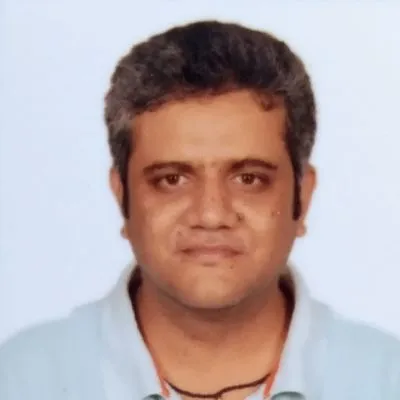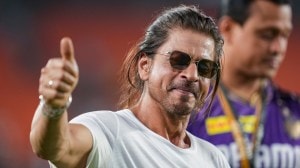Vikas Pathak is deputy associate editor with The Indian Express and writes on national politics. He has over 17 years of experience, and has worked earlier with The Hindustan Times and The Hindu, among other publications. He has covered the national BJP, some key central ministries and Parliament for years, and has covered the 2009 and 2019 Lok Sabha polls and many state assembly polls. He has interviewed many Union ministers and Chief Ministers. Vikas has taught as a full-time faculty member at Asian College of Journalism, Chennai; Symbiosis International University, Pune; Jio Institute, Navi Mumbai; and as a guest professor at Indian Institute of Mass Communication, New Delhi. Vikas has authored a book, Contesting Nationalisms: Hinduism, Secularism and Untouchability in Colonial Punjab (Primus, 2018), which has been widely reviewed by top academic journals and leading newspapers. He did his PhD, M Phil and MA from JNU, New Delhi, was Student of the Year (2005-06) at ACJ and gold medalist from University Rajasthan College in Jaipur in graduation. He has been invited to top academic institutions like JNU, St Stephen’s College, Delhi, and IIT Delhi as a guest speaker/panellist. ... Read More
Singur to Sanand, how Ratan Tata engaged politicians across the political spectrum
Deft at doing business with politicians while maintaining enough of a distance, he bagged a deal from Narendra Modi, the then CM of Gujarat who was trying to build an industry-friendly image, to set up the car factory at Sanand in Gujarat instead.
 Ratan Tata and former Bengal Chief Minister Buddhadeb Bhattacharya. (Express Archives)
Ratan Tata and former Bengal Chief Minister Buddhadeb Bhattacharya. (Express Archives)About 15 years ago, Ratan Tata promised something that would shake up the Indian vehicle market – Tata Nano, a car that would cost just Rs 1 lakh and fulfil the middle-class dream of owning a four-wheeler. It became commonly known as the Lakhtakia car, the Hindi equivalent of a Rs 1 lakh car.
The proposal, though, faced significant roadblocks. His proposed car factory at Singur in Bengal – this was when Buddhadeb Bhattacharya as the CPI(M)’s Bengal Chief Minister was trying to attract investment to the state and change the direction of his party – got caught in a land acquisition row, as Mamata Banerjee, keen to replace the CPI(M), launched a movement against the plan.
Tata did not wait long for the Singur crisis to resolve. Deft at doing business with politicians while maintaining enough of a distance, he bagged a deal from Narendra Modi, the then Chief Minister of Gujarat who was trying to build an industry-friendly image, to set up the car factory at Sanand in Gujarat instead.
Singur’s loss turned out to be Sanand’s gain. The quick offer made by Modi also went a long way in building his image as a CM who could attract investment to his state. Today, Sanand in Gujarat is an automotive hub, with a Tata car plant spread over 1,100 acres and producing 30% of the cars made by the company.
Through his life, Tata showed he could engage with parties across the political spectrum.
In October 2012, he went to Kashmir with Congress’s Rahul Gandhi, met the then Chief Minister Omar Abdullah and also interacted with students of the Kashmir University, addressing them as “the great wealth of human capital available in the state”. In his meeting with Abdullah, he expressed his desire to expand the Tata group’s activities in the state. Praising Rahul for the visit, he said that the Congress leader had not opened a window but a door for investors.
In April 2019, at the time of the general elections, Tata met RSS chief Mohan Bhagwat at the Sangh’s headquarters in Nagpur for what the Sangh called a courtesy call. He had also visited the RSS headquarters in 2016.
In February 2019, Tata praised the leadership of PM Modi and the Indian Air Force for the Balakot airstrike in Pakistan, saying India was proud of the firm action taken against the attack on soldiers at Pulwama.
Tata’s father Naval Tata had contested the 1971 elections from South Bombay as an independent candidate, supported by the Shiv Sena, and stood second with 40% votes. However, Ratan Tata showed no inclination to join politics. He was, however, deft at negotiating with governments for investing in states.
During an interaction with the Ladies Study Group of The Indian Chamber of Commerce in Kolkata in 2014, he said, “Like my mentor JRD Tata, I had never considered politics. I am not cut out to be a political person and will not venture into it. The water there is very very deep. I would like to be remembered as somebody who never hurt others and did work to the best interest of business.”
In his otherwise stellar business career, Tata landed in a controversy in 2010, when the Nira Radia tapes were leaked. The transcripts of Tata’s conversations with the corporate lobbyist ran into 5,400 pages and covered six months spread over 2008 and 2009. Tata petitioned the Supreme Court, calling for action against those who leaked the tapes, citing the right to privacy. In 2022, the CBI told the Supreme Court that no evidence of criminality was found in the Radia tapes.
Photos




- 01
- 02
- 03
- 04
- 05




























